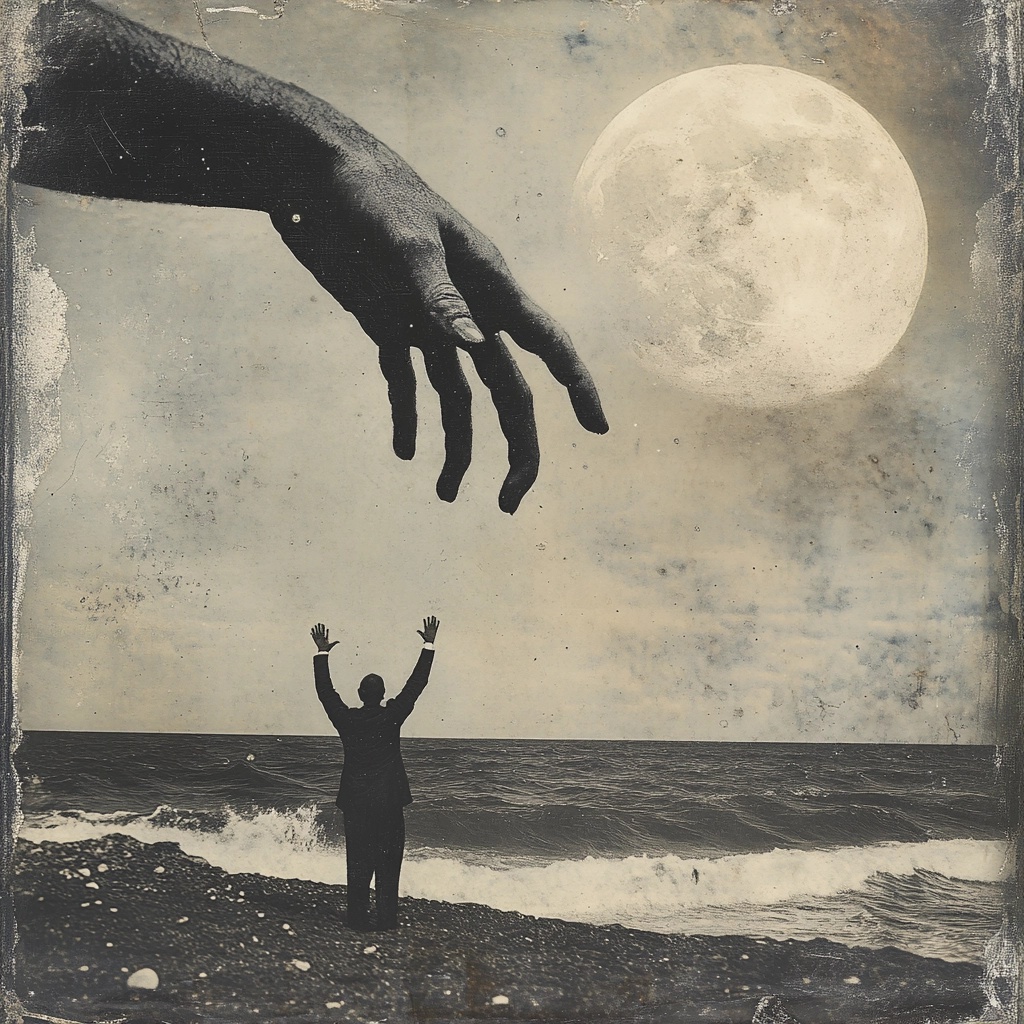PLAYING CATCH (3)
By:
June 22, 2025

Algernon Blackwood’s “Playing Catch” appeared in the 1924 collection Tongues of Fire and Other Sketches. HiLoBooks is pleased to serialize the story for HILOBROW’s readers.
ALL INSTALLMENTS: 1 | 2 | 3 | 4 | 5.
He considered what he had seen, he made justifiable inferences, he drew sound conclusions. It pleased him particularly to find that these held water, as he called it. Thus he was delighted to establish — since the moon had been thrown away and then thrown back again—that two great figures were tossing her to and fro together across outer space, and that a spirit of amusement, even of sheer happy fun, evidently inspired the majestic spectacle. It was, perhaps, a game, a match possibly, a trial of skill at any rate, since one hand only was employed. The two gorgeous players were enjoying themselves. They were playing catch.
It made him happy to think that he had witnessed at least one mighty stroke in their magnificent game, and still more happy — comforted as well — to realise that, at long last, the intolerable quantity of the heavenly bodies, together with their overwhelming speeds and distances, were thus reasonably explained. He weighed his inferences cautiously, he examined his deductions; his logic and premises were sound, he could find no flaw in his reasoning. It was obvious to him that all the heavenly bodies, whose numbers had long dismayed him, as their raison d’être had thwarted him, that all of these — stars, suns, planets, comets — were being similarly thrown from hand to hand, most of them, with century-long, some with age-long tosses, and that the purpose of the colossal Universe was at last made clear.
He wondered if Mabel also knew; he hoped she did. To his boldest speculations her contribution had been invariably “But why bother, dear? What can it matter to us?” Did she now share the relief and wonder of his superb discovery that all the heavenly bodies were used by angels for the purposes of — happy play?
***
His mind, it is seen, worked admirably, his faculties retained their normal sharpness, the clarity of his thought was unimpaired. How, why, by what happy chance, he had witnessed only one stroke in the game, this, too, was quite clear to him at the moment, though he had difficulty in setting it down later in his written account of the occurrence. Relativity, of course, helped in the first easy stages of the explanation. Four measurements, he remembered, one of which is Time, are necessary to locate a point in space; and until that point is thus located and in position, it has not become an event — it has not “happened.” Clearly, then, he had witnessed an occurrence in four-dimensional space. It was an event, it had happened, though not necessarily now.
This fourth measurement of Time troubled him for a moment, but for a moment only. He looked at his watch, he began to make elaborate calculations at the back of his head, and then confusion overtook him. … What remained, however, was the positive assurance that this playing catch with the moon filled him with the joy of a comfortable understanding. One of his big questions, at least, was satisfactorily answered.
He resumed his walk along the seafront, therefore, at a steady gait, stimulated, though not unduly so, and by no means shaken. That his mental balance held true is proved by the fact that, as he turned homewards, his mind dealt with commonplace things quite naturally. He thought of his lodgings, remembering that he liked them because baths were included in the terms, that early morning tea was only three pence, and that he could turn the light out from his bed. Also, he once more remembered Mabel. And again he asked himself: was she aware of him in this magnificent moment? For Mabel, he suddenly realised with a qualm of peculiar distress, was involved somewhere in the entire business. This realisation, coming abruptly, caused an odd uneasiness, and the uneasiness spread, till it was established in his whole being. Mabel, it flashed through him, though involved, was not involved — quite openly. There was an unpleasant touch of subterfuge, a hint of plan, of purpose, almost of plot: his original idea of Mabel, his fond, admiring, yet rather stupid wife, had undergone a disagreeable change. It was as though she now stood mysteriously behind the scenes, unpleasantly concealed — secreted.
The confused conviction that Mabel played this hidden role began to trouble him. …
Meanwhile, the splendour he had witnessed brought a touch of soberness in its train. The after-effect of splendour is invariably of a sedative description, and this reaction now set in, accompanied by a feeling of disappointment that just stopped short of distress and yet held the seed of faint alarm. The breath of uneasiness blew through him. It was slight, impossible to seize. He noticed it, no more than that, yet its presence lurked, if not definite enough yet to cause acute disturbance. It remained a vague sinking of the heart, due to something that was not fully explained. Mabel, however, he felt sure, would explain it — if she could. Here, at last, was something Mabel really knew. Here was a contribution she could make — if she would.
RADIUM AGE PROTO-SF: “Radium Age” is Josh Glenn’s name for the nascent sf genre’s c. 1900–1935 era, a period which saw the discovery of radioactivity, i.e., the revelation that matter itself is constantly in movement — a fitting metaphor for the first decades of the 20th century, during which old scientific, religious, political, and social certainties were shattered. More info here.
SERIALIZED BY HILOBOOKS: James Parker’s Cocky the Fox | Annalee Newitz’s “The Great Oxygen Race” | Matthew Battles’s “Imago” | & many more original and reissued novels and stories.
